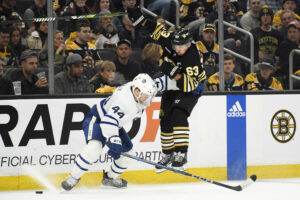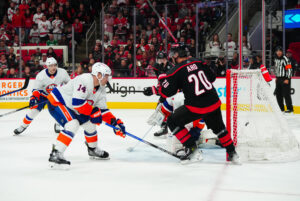Not many summers in the life of the San Jose Sharks Doug Wilson will be as momentous as this one. The clock finally ran out on the absurdity of Wilson’s absence from the Hockey Hall of Fame. To be blunt, Wilson was on too many lists where he was the only one to have accomplished the things he accomplished and not be in the Hall. But sanity finally showed up and Wilson is in. Formal enshrinement, though, may have to wait until COVID-19 diminishes.
Later in the same week, one of the best general managers in the NHL likely looked on to see the damage to his reputation. Wilson’s trade for Erik Karlsson required sending a first-round draft pick to the Ottawa Senators. A pick that was not ‘lottery-protected’. The Sharks dismal season left the pick in lottery territory, something hard to imagine when either the trade or subsequent re-signing happened. Wilson, the GM since 2003, has never drafted in the top five, and to have traded away the lone chance to do so stands out in a bad way. In the end, Wilson traded away the third spot in the upcoming draft. About the best which could be said, it could have been worse.
Sharks Doug Wilson and His Stanley Cup Window
Even with the big events, the Sharks Doug Wilson likely notices a clock continuing to tick, slowly and steadily.
One thing has escaped Wilson in his remarkable hockey life, the Stanley Cup. It seemed inevitable his Sharks teams would break through and win a Cup at some point. They were consistently among the league’s most talented teams and generally well-rounded.
Nothing seems inevitable now. The Sharks, for the first time in Wilson’s 17-year tenure, had a genuinely bad season. And while the sense is things will get better, there’s a big difference between getting better and winning a Cup.
Sharks Doug Wilson and Big Moves
For most of Wilson’s tenure in San Jose, one move has reigned supreme. In November 2005, he traded for Joe Thornton. And for over a decade, Thornton keyed the Sharks to one competitive season after another.
The Stanley Cup window remained open as long as Thornton remained in his prime. It helped that the durable center had a long prime. He’d win the Hart Trophy in his first season in San Jose. A decade later, he was still playing elite hockey and probably deserved another Hart Trophy in 2015-16 season, with league-leading even-strength goals for (GF%) over 70%, the leader of the league’s top power play and defensively, a Selke candidate (finishing fifth).
For the Sharks Doug Wilson, his Stanley Cup window was tied to Thornton. As long as the player affectionately known as Jumbo was an elite player, the Sharks window was open.
Re-Opening the Sharks Window
Alas, Father Time caught up with Thornton, and two major knee surgeries have diminished the once formidable player. Still, the Sharks remained competitive due to a host of players, including defencemen Marc-Edouard Vlasic and Brent Burns along with talented forwards Joe Pavelski, Logan Couture, Tomas Hertl and Evander Kane.
This talent was competitive, but not enough to get the Sharks a Cup. Wilson needed a second act. His June 2018 pursuit of free agent John Tavares, a perfect fit for the team’s Jumbo-sized line-up hole, came up short. But shortly thereafter, he then shocked the hockey world with a major move. Wilson acquired the sort of player who can take a good team and make it great. In September 2018, Wilson acquired Erik Karlsson.
The Karlsson acquisition kicked the Sharks’ Stanley Cup window open again.
The Race Against Time
Alas, Wilson’s talented core, including Karlsson, have all reached their peak. More worrisome is an expected decline. Few hockey players improve past age 30, and the Sharks have plenty of key players who’ve reached that age and a few who’ve moved well beyond it. It is straightforward to visualize Wilson’s situation. If he does nothing, a curve showing expected performance will have key players declining from one season to the next. At some point, there will be too much decline and not enough improvement from other parts of the roster to be competitive.
By my count, the Sharks have five contracts with players likely to decline between now and their contract completion. The contracts range from $7.0 million to $11.5 million and combine for $41.5million of cap space, a tad over 50% of the current salary cap (age is as of April 1, 2021, the time of year when the next Sharks chance to be part of a Stanley Cup playoffs might begin).
Brent Burns, age 36, contract ends 2025 at age 40
Logan Couture, age 32, contract ends 2027 at age 38
Marc-Edouard Vlasic, age 34, contract ends 2026 at age 39
Evander Kane, age 29, contract ends 2025 at age 34
Erik Karlsson, age 30, contract ends 2027 at age 36
Can Wilson trade any of the players? Perhaps, but all have limited or no-movement clauses. From a salary cap perspective, none of the deals are better than even value, some are far worse. Any trade is likely to bring back far less than a premium player or draft pick.
While Wilson had little wiggle room, to begin with, the impact of COVID-19 on the salary cap over is going to be substantial. The salary cap, for those with too many large contracts, the next few seasons are the NHL equivalent of a straight jacket. Murphy’s Law is in full force.
The Decline in Real-Time
The sooner the Sharks can make another Cup attempt, the better because the longer they wait, the greater the overall decline from these players. The question is not whether these players will decline over the course of their contracts, the question is when.
Alas, ‘sooner’ has a lot of challenges, including limited cap space, a very modest pipeline and younger players who showed limited development last season. Any attempt at ‘sooner’, such as a major free agent signing, almost certainly creates ripple effects, resulting in both medium and longer-term problems.
Some think the declining play is already happening. For the 2018-19 season, Wilson assembled an elite roster; the best in franchise history. And it didn’t win a Cup. But in 2019-20, several of these expensive veterans showed declines, including Vlasic and Burns. Vlasic, in particular, went from one of the league’s best value contracts to one of the worst over just three years.
Wilson made a bet that his elite talent would remain elite long enough to capture a Stanley Cup. This bet is now in the long-shot territory.
Evander Kane and Martin Jones
Kane had a good year, a rare season in which he was healthy all the way through. Some might wonder why I included Kane on this list, given his deal runs only through age 34. Simple. His history says he is injured often and usually come playoff time, his health is compromised. Power forwards tend to hit the wall a bit earlier than other types of players. Effective 34-year-old power forwards (those who typically have 100+ hits per season) are tough to find. Corey Perry, Wayne Simmonds, James Neal and Ryane Clowe are among the prototypical power forwards whose careers took a dive at around age 30. Kane may avoid the same fate, but the profile is riskier.
At least one other longer-term deal is troubling. Goalie Martin Jones, age 30, is signed through 2024 at $5.75 million per season. While Jones won’t be particularly old by goalie standards when the deal expires, he has been among the league’s worst netminders over the last two seasons. There is reason to believe he can turn things around, but certainly no guarantee.
Questionable Options
Wilson can trade away overpriced players, though any trade is almost certain to leave the Sharks worse off, talent-wise, in the near-term. Few teams are interested in trading for an expensive player whose contract has ‘long-term liability’ stamped all over it. In a race against time, each passing year the team takes a step back isn’t going to help.
The team’s pipeline has one promising talent, defenceman Ryan Merkley. Merkley is the lone first-round draft pick in the team’s system but is probably another year away. Aside from Merkley, whose NHL success is hardly a given, the pipeline may fill in some lower line holes. But there are plenty of holes to fill and the Sharks will need more than the pipeline has shown it can provide.
The Sharks, like every other team, are aware of the expansion draft for the Seattle team. Roughly a year away, Wilson will likely be able to force-feed the expansion team a contract which no longer works for the Sharks. Alas, this is another scenario that requires waiting.
But the Sharks can’t simply wait to take their shot. The Sharks need help sooner since the expensive talent is certain to decline year after year.
The Alternative
Should the Sharks stop and rebuild? This is a hard one since the team is not far removed, time-wise, from a highly competitive season.
Several factors are conspiring to make this alternate worth considering. We touched on the impact of COVID-19 and the salary cap. There is a group of teams with a high percentage of cap space committed to a small number of players for lengthy terms. These teams will not have a cap space wiggle room. The Sharks are the poster child for this dilemma.
Under normal circumstances, it would be hard to trade high-end trade players with the sorts of contracts the Sharks have. A tighter salary cap makes this an even tougher task. After all, other teams are going to have limited cap space as well.
Further, the NHL season is likely to get compressed from a 12-month calendar to a shorter calendar, meaning fewer recovery times and more compressed schedules. Neither helps a Sharks team which tilts older.
The Sharks have holes in the draft in 2020 and 2021, so the modest current pipeline impacts any rebuild, and reduces draft picks. Any rebuild will require a strong pipeline, which can deliver quality young players year after year. The Sharks aren’t there.
There is essentially nothing that suggests a rebuild can be done quickly.
The Stanley Cup Formula
It is worth noting that for six weeks in 2018-19, the Sharks proved one could run a team with elite defencemen and play dominant hockey. For that short stretch in late 2018 and early 2019, they played as well as any team did all season. The roster approach can work. But each year which goes by, the odds of it working with this core group grow longer.
The Sharks have never undergone a rebuild in Wilson’s tenure and it isn’t going to start now. But the gap between where the Sharks are and where they need to be to contend is quite large. Especially lacking are middle-tier players, ones essential to a successful team.
There is one formula that works, but it is the most fickle of all. It involves having all the players synch-up and play well at just the right time. Be a good enough team to make the playoffs, and have everyone both healthy and playing well come playoff time. I’d say it’d be like trying to draw to an inside straight, but the poker odds are better than the Sharks odds.
Some players are in a declining trend, but one can have a ’bounce-back season’ in the midst of a longer-term decline. Another player might raise their game for the playoffs or perhaps find the fountain of youth at the opportune time. Perhaps even, get a hot goalie to complement the rest.
This is what it is coming to for the Sharks. A decade and a half of highly competitive teams coupled are coming home to roost. The hope-filled contracts leave the Sharks salary cap challenged. These contracts are destined to go sour in their later stages. This has left the Sharks with a very narrow path forward.
Time is a relentless foe. The Sharks Doug Wilson recently turned 63. A full rebuild will be on the agenda for the first time in nearly 20 years. It will likely begin within the next few years. If Wilson is to get a Stanley Cup in San Jose, it’ll need to happen soon. Maybe very soon, because the owner’s patience may run down if the Sharks suffer another down season. The Sharks need to feast sooner than later. As the Beatles once asked, “Will you still need me, will you still feed me, when I’m 64?” For the Sharks Doug Wilson, that question is also out there.
Zeke’s Notes
Former Sharks winger Tommy Wingels retired from professional hockey last month. Wingels was among the Sharks heavy hitters and had some solid early seasons, registering a franchise record 263 hits in the 2014-15 season. But the Sharks overpaid him, and Wingels’ career flatlined. He then fell out of favour with coach Peter DeBoer, and in early 2017, the Sharks traded him. Wingels played for three more NHL teams before departing for Switzerland. Most fans remember him fondly. His off-ice work was particularly important; he played a large role in the “You Can Play” initiative. Among other tributes, Brian Burke’s stands out for capturing the importance of what Wingels did and how very personal taking a stand is.
Main Photo:
Embed from Getty Images






